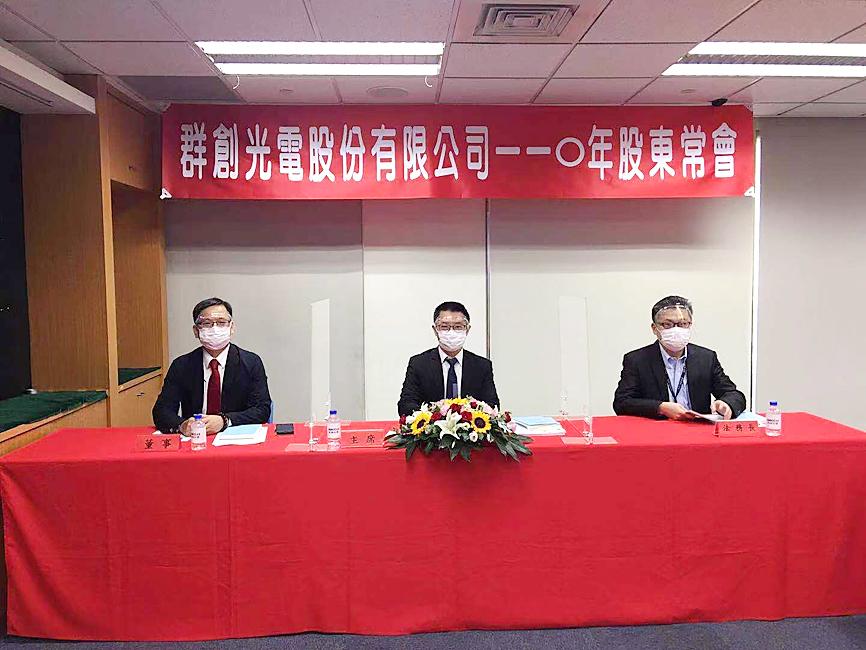LCD panel maker Innolux Corp’s (群創光電) shareholders yesterday approved the company’s proposal to divest its shares in InnoCare Optoelectronics Corp (睿生光電), paving the way for the medical display manufacturer’s initial public offering (IPO).
InnoCare would be the first spin-off from Innolux that goes public as the company undergoes further restructuring. The IPO plan comes amid high demand for medical devices and displays due to the COVID-19 pandemic.
Founded in April 2019, InnoCare has paid-in capital of NT$310 million (US$11.11 million).

Photo courtesy of Innolux Corp
It manufactures X-ray image sensor displays that are used in hospitals and clinics for digital X-rays, replacing conventional X-ray films.
Innolux said the IPO plan would help facilitate the expansion of InnoCare, retain talent and introduce strategic partners.
The company said it is to retain at least a 50 percent stake in InnoCare following its debut, but did not give a detailed roadmap for its IPO plan.
Headquartered in Miaoli City, Innolux is one of the world’s biggest suppliers of medical displays, ranging from 15-inch to 23.8-inch high-definition display modules used in computed radiography, digital radiography, magnetic resonance and mammography.
Aside from InnoCare, Innolux in March 2019 spun off its vehicle display business and founded CarUX Technology Inc (群豐駿), with paid-in capital of NT$1.4 billion.
The company plays a major role in the vehicle display supply chain, with customers including Tesla Inc, BMW AG, Ford Motor Co and General Motors Co.
InnoCare and CarUX are based in Tainan’s Southern Taiwan Science Park (南部科學園區).
Innolux shareholders also approved a proposal to distribute a cash dividend of NT$0.4 per share, with the company allocating NT$1.05 billion from capital surplus to fund part of the distribution.
That translates into a dividend yield of 1.9 percent based on Innolux’s closing share price of NT$20.75 yesterday.
Innolux returned to the black last year, posting a net profit of NT$1.64 billion, or NT$0.17 per share, compared with a loss of NT$17.44 billion, or minus-NT$1.77 a share, in 2019.

DIVIDED VIEWS: Although the Fed agreed on holding rates steady, some officials see no rate cuts for this year, while 10 policymakers foresee two or more cuts There are a lot of unknowns about the outlook for the economy and interest rates, but US Federal Reserve Chair Jerome Powell signaled at least one thing seems certain: Higher prices are coming. Fed policymakers voted unanimously to hold interest rates steady at a range of 4.25 percent to 4.50 percent for a fourth straight meeting on Wednesday, as they await clarity on whether tariffs would leave a one-time or more lasting mark on inflation. Powell said it is still unclear how much of the bill would fall on the shoulders of consumers, but he expects to learn more about tariffs

Meta Platforms Inc offered US$100 million bonuses to OpenAI employees in an unsuccessful bid to poach the ChatGPT maker’s talent and strengthen its own generative artificial intelligence (AI) teams, OpenAI CEO Sam Altman has said. Facebook’s parent company — a competitor of OpenAI — also offered “giant” annual salaries exceeding US$100 million to OpenAI staffers, Altman said in an interview on the Uncapped with Jack Altman podcast released on Tuesday. “It is crazy,” Sam Altman told his brother Jack in the interview. “I’m really happy that at least so far none of our best people have decided to take them

PLANS: MSI is also planning to upgrade its service center in the Netherlands Micro-Star International Co (MSI, 微星) yesterday said it plans to set up a server assembly line at its Poland service center this year at the earliest. The computer and peripherals manufacturer expects that the new server assembly line would shorten transportation times in shipments to European countries, a company spokesperson told the Taipei Times by telephone. MSI manufactures motherboards, graphics cards, notebook computers, servers, optical storage devices and communication devices. The company operates plants in Taiwan and China, and runs a global network of service centers. The company is also considering upgrading its service center in the Netherlands into a

NOT JUSTIFIED: The bank’s governor said there would only be a rate cut if inflation falls below 1.5% and economic conditions deteriorate, which have not been detected The central bank yesterday kept its key interest rates unchanged for a fifth consecutive quarter, aligning with market expectations, while slightly lowering its inflation outlook amid signs of cooling price pressures. The move came after the US Federal Reserve held rates steady overnight, despite pressure from US President Donald Trump to cut borrowing costs. Central bank board members unanimously voted to maintain the discount rate at 2 percent, the secured loan rate at 2.375 percent and the overnight lending rate at 4.25 percent. “We consider the policy decision appropriate, although it suggests tightening leaning after factoring in slackening inflation and stable GDP growth,”